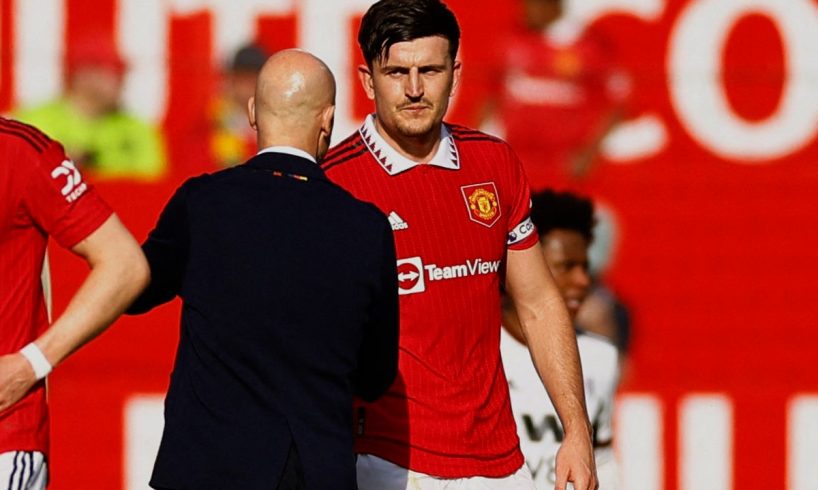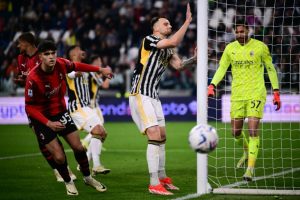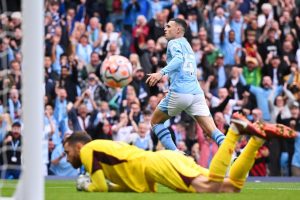
Manchester City have only lost one of their last 27 games and it was the one Shea Charles played in. Not that many noticed: attention on the final day of the Premier League season was focused on the relegation battle, not a weakened City team’s 1-0 defeat at Brentford, as Charles came on for the final 27 minutes while others were rested for the FA Cup and Champions League finals. The midfielder has eight caps for Northern Ireland but the chances are that the first many had heard of the 19-year-old was when he joined Southampton for a fee rising to £15m this month.
When Manchester United bought Mason Mount, meanwhile, they both made a positive start to their own summer makeover and helped Chelsea recoup some of the vast amounts they have spent. The England international’s £55m price is a reason why Todd Boehly and co have brought in around £200m this transfer window. It may be a grand sell-off that appears as frantic as their buying binge, but Chelsea are at least disposing of players: City, in contrast, are profiting from those who have barely played for them. James Trafford – there is an irony in the surname for United – will make City £19m when his move to Burnley goes through.
Meanwhile, United have sold no one other than Zidane Iqbal for £850,000. It is more than just a curiosity or a cause of frustration among the fanbase, but an issue that cuts to the heart of various issues at Old Trafford. Andre Onana’s imminent arrival takes United’s summer spending to almost £100m; thus far, however, they have recouped under £1m when their outlay amounts to the vast majority of their budget, after overspending last summer and when it is no secret they want a centre forward.
Last week brought the embarrassment of the club being found guilty of breaching Financial Fair Play (FFP), albeit in a minor, technical way that United attributed to the way Uefa reported Covid losses amid changing regulations. FFP limits their spending now, but a way to get more leeway is to sell well, as both City and Chelsea often have in recent years.
For United, however, the struggle to sell has been a constant. In the last decade, excluding homegrown players, only five signings – Dan James, Javier Hernandez, Daley Blind, Chris Smalling and Alexander Buttner – have left for profits. Too many players have not been sold at all: United got rid of Paul Pogba, Edinson Cavani, Nemanja Matic, Juan Mata and Jesse Lingard last summer, but without bringing in a fee for any. United are conscious of the need to offload players for more money but, as this summer’s impasse shows, it is easier said than done.
It is harder to persuade players to leave a destination club. A habit of overpaying their footballers can deter suitors – Brandon Williams, for one, is thought to get a salary that few such average full backs could expect – and their wages go up for seasons when they are in the Champions League; so, Harry Maguire has got a pay rise that renders him still costlier for any potential buyer.
Maguire has been stripped of the captaincy ahead of a potential United exit (Getty Images)
Yet Maguire’s status represents one embarrassment; he has been stripped of the captaincy, and it would be easier for Ten Hag were United to find someone to compensate them for at least some of the £80m they invested in him. The demanding Dutchman can be impatient to accelerate a rebuild and that is harder when his squad is still clogged up with players he inherited.
And thus far the first-team departures amount to six men whose deals were up: the out-of-contract trio of David de Gea, Phil Jones and Axel Tuanzebe and the three loanees, Jack Butland, Marcel Sabitzer and Wout Weghorst. Meanwhile, United know there is no future at Old Trafford for Eric Bailly and Alex Telles. Maguire, too, should be surplus to requirements, along with Williams, Anthony Elanga and Donny van de Beek. With Mount arriving, there is scope to part company with one of Fred and Scott McTominay, both of whom have admirers. There is room for Facundo Pellistri or Amad Diallo but probably not both. And yet all remain on the books.
There are mitigating factors. There is still time in the transfer market. It did not make sense to sell the sellable Henderson until Onana’s arrival was rubber-stamped. He should go; Elanga, too. But there is a test of United’s negotiating skills and if part of the challenge is to dispose of the unwanted, part of it is to establish a reputation as sellers, rather than simply giving players away. They are conscious of the ‘United tax’, where clubs raise the asking price when a call comes in from Old Trafford, but it seems to harm them both ways; some buyers in the past have known they could get away with offering United negligible sums.
Which, when Ten Hag’s transfer budget depends in part on how much United can bring in, is costly. It may be playing Championship Manager economics, but there is a scenario where they could have cashed in on fringe figures to the tune of £100m; surely not now. They might have missed the boat for trading with Saudi Arabia. They may be casting envious glances at Chelsea – even if their selling spree is partly a product of a silly spending spree – and City, with their habit of making money from youth-team products. They may think back to Sir Alex Ferguson’s days, when many a club attached a value to plenty of United’s cast-offs. But, first and foremost, there is a financial reality. If Manchester United have rarely been a selling club, they now need to prove they can sell.






